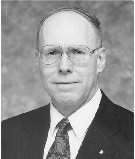Michael Adler: Difference between revisions
No edit summary |
No edit summary |
||
| (5 intermediate revisions by 3 users not shown) | |||
| Line 1: | Line 1: | ||
== Michael Adler | {{Biography | ||
|Image=Michaeladler.jpg | |||
|Associated organizations=[[General Electric (GE)]] | |||
|Fields of study=Semiconductors | |||
|Abstract=contributed to the invention and development of new power semiconductors (the IGBT, the power MOSFET, and the power IC) when he worked at GE. | |||
|Organization=IEEE | |||
|StartYear=2003 | |||
|Display name=Michael S. Adler | |||
}} | |||
Dr. Michael Adler graduated from MIT in 1971 as a PhD in the area of solid state physics. | |||
He began work at [[General Electric (GE)|General Electric]] in 1971. In his early career at GE, Adler was involved with the invention and development of a new generation of power [[Semiconductors|semiconductors]] including the IGBT, the power MOSFET, and the power [[Integrated Circuits|IC]]. From 1985 until his retirement in 2000, he headed a laboratory of 150 people to develop [[power electronics]], control systems, and high-density electronic assemblies. | |||
After his retirement from GE, Adler served as Vice President of Technology of Mechanical Technology Inc. (MTI), and Research Professor at Rensselaer Polytechnic Institute. With these groups he helped develop micro fuel cells for cell phone use and worked on advanced power semiconductors. | |||
He | He has published over 100 papers and was elected [[IEEE Fellow Grade History|IEEE Fellow]] for his work in power devices. Adler was [[Presidents of the Institute of Electrical and Electronics Engineers (IEEE)|IEEE president]] in 2003. | ||
== Further Reading == | |||
[[Oral-History:Michael Adler|Michael Adler's Oral History]] | |||
[[Category:Semiconductor materials]] | |||
[[Category:Integrated circuits]] | |||
[[Category:Engineers]] | |||
{{DEFAULTSORT:Adler}} | |||
Latest revision as of 16:41, 8 February 2016
- Associated organizations
- General Electric (GE)
- Fields of study
- Semiconductors
2003
Michael S. Adler, IEEE President, 2003, contributed to the invention and development of new power semiconductors (the IGBT, the power MOSFET, and the power IC) when he worked at GE.
Biography
Dr. Michael Adler graduated from MIT in 1971 as a PhD in the area of solid state physics.
He began work at General Electric in 1971. In his early career at GE, Adler was involved with the invention and development of a new generation of power semiconductors including the IGBT, the power MOSFET, and the power IC. From 1985 until his retirement in 2000, he headed a laboratory of 150 people to develop power electronics, control systems, and high-density electronic assemblies.
After his retirement from GE, Adler served as Vice President of Technology of Mechanical Technology Inc. (MTI), and Research Professor at Rensselaer Polytechnic Institute. With these groups he helped develop micro fuel cells for cell phone use and worked on advanced power semiconductors.
He has published over 100 papers and was elected IEEE Fellow for his work in power devices. Adler was IEEE president in 2003.
Further Reading
